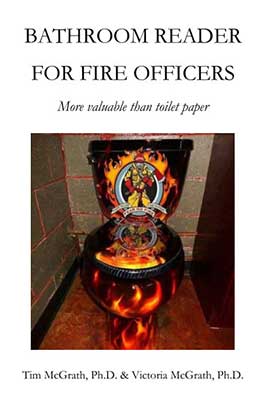What Business Are You Really In?
by Dr. Tim McGrath & Dr. Victoria McGrath

I was interfacing with a very large metropolitan fire/EMS department and had an opportunity to ride along to "watch how the big City does it". Old race horses like old Fire Chiefs always dream they could be back into their full stride within minutes if given the opportunity - the more arrogant confident ones believe they don't even need that much time.
Most interesting was a fire in a three story "taxpayer" (business with apartments above) structure in a less than modern section of the City. A man was hanging from a third story window ledge (how and onto what is still a miracle within itself) clearly having received some serious burns as flames lapped just above his head. An engine company was first to arrive and quickly put up a ground ladder and began to climb towards the victim; only to have the victim jump towards the rescuer. This action almost sent the rescuer and victim tumbling to the ground from about the second floor level. Due to the firefighter's skill and training he broke the fall and carried the victim to the ground.
Then a strange thing happened; after confirming the victim was breathing and would survive the firefighter and crew simply walked away while he laid on the sidewalk. Soon the ambulance crew (same department) arrived and the victim found a new set of rescuers to aid him. I listened intensely that afternoon around the station's table as the crew relived the rescue, becoming increasingly perplexed to find that it appeared that no one saw any opportunities to change the way "things went down".
I also had an opportunity to watch and listen to the citizens who witnessed this daring rescue. They angrily expressed that "the firemen - including the one that made the rescue - didn't care about them". When I foolishly mentioned this point to the fire crew that the citizens were very upset, the firefighters became angry noting they "did their job" and saved a life; wasn't that enough? Of course if I had not witnessed the rescue I'm not sure I would have been able to comprehend the entire situation. I would like to believe this was an isolated occurrence and would never happen in your department - mostly likely a safe assumption. Was it a bad department, just a bad day, just that lone crew, or just following my job description? Regardless, what was missed was an opportunity. The same missed opportunities, but under much less heroic circumstances, Chief's face often who resist change.
Certainly EMS has become an integral aspect of today's service delivery along with hazardous materials, special above ground, below ground, and/or water rescue teams, not to mention inspections and public safety education. Fortunately, or unfortunately depending on your perspective, fire suppression is a very small part of what most fire departments do today. A much higher percentage of emergency calls involve EMS and according to National Association of Emergency Medical Technicians December 2009 statistics, 48.6% of all EMS delivery is performed by fire-based services.
More and more often I am asked by governing officials why do we continue to provide fire and EMS based on a fire model verses an EMS model? Wouldn't it be cheaper and even more important to realign our resources for the upwards of 70+% (EMS) of the actual emergencies? Questions like these occur when there is an alignment of shifting societal values and economic necessities, which pretty much describes today's environment.
The fire service is a business which delivers services and the 'citizens' are the customers who are those in need of those services. We are and always have been in the business of helping people. However, today to define exactly what that means we need to ask our customers what they want and what value they place on that request. This is suppose to be done by elected governing officials who are the "voice of the people".
It isn't enough to be in the business of helping people. We need to now to look at the future and ask ourselves what business would it be useful for us to be in. Once we can answer that question we need to align our organizations' resources, direction and attitudes towards that goal to say in tune with change. We as a society are moving away from a central direction to a society of diversity. The rules have changed and maybe it is time to at least assess if the base model of service delivery needs to be reassessed and aligned with today's enivornment.
There will always be fires to fight, victims to treat, and a host of other activities conducted by today's progressive fire service, but just for fun Chief, if someone else was to take away all of your EMS incidents and left only actual fire fighting as your sole primary function, how different would your organization look? I not suggesting this should be the goal; rather this should be the foundation on which you build the service delivery model. If nothing else it's an interesting exercise because eventually you will be asked as to how you deliver your service. Of course the most often question we are asked by governing officials is, "does the fire engine always have to respond with the ambulance" - another article perhaps.





